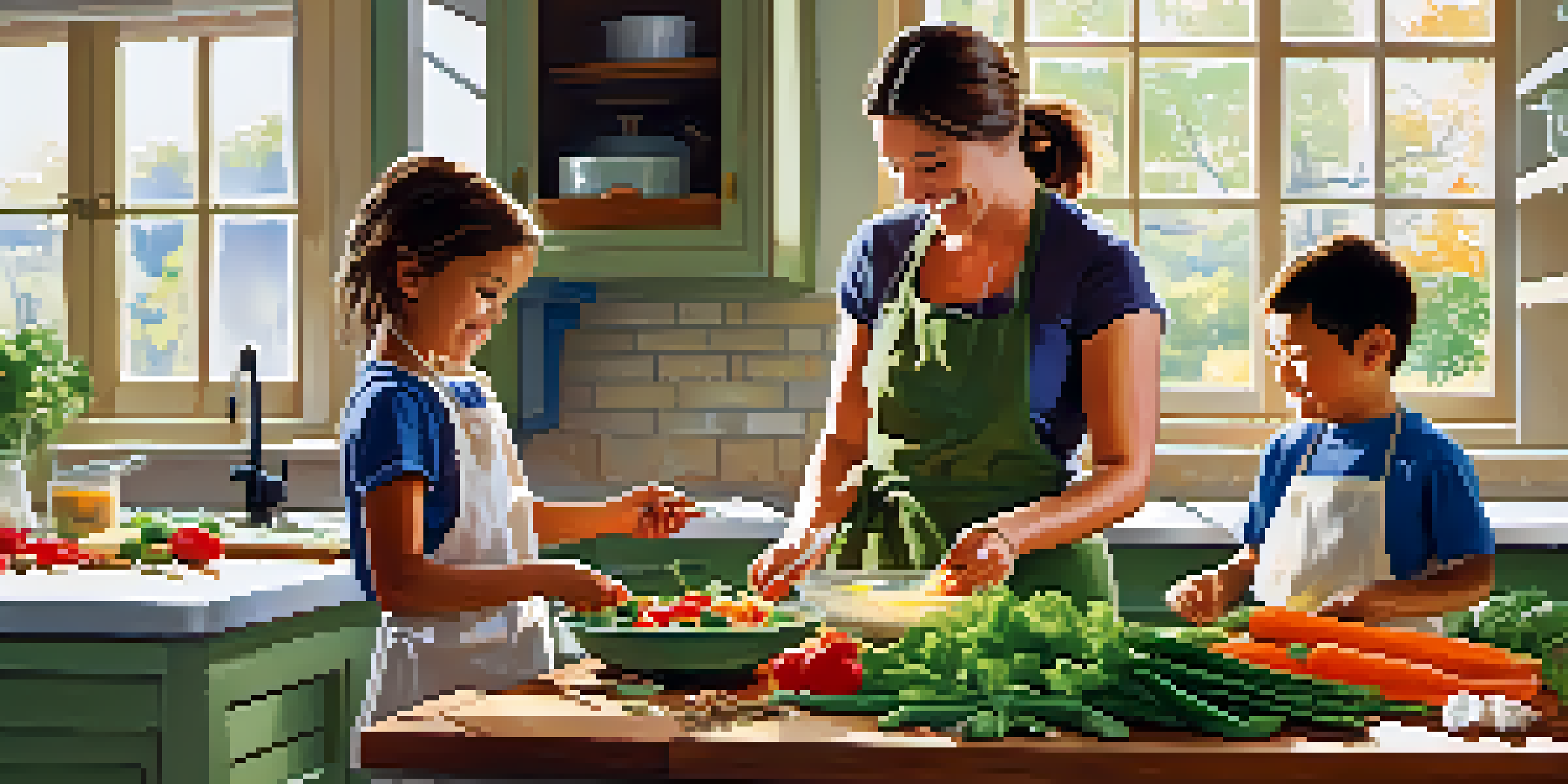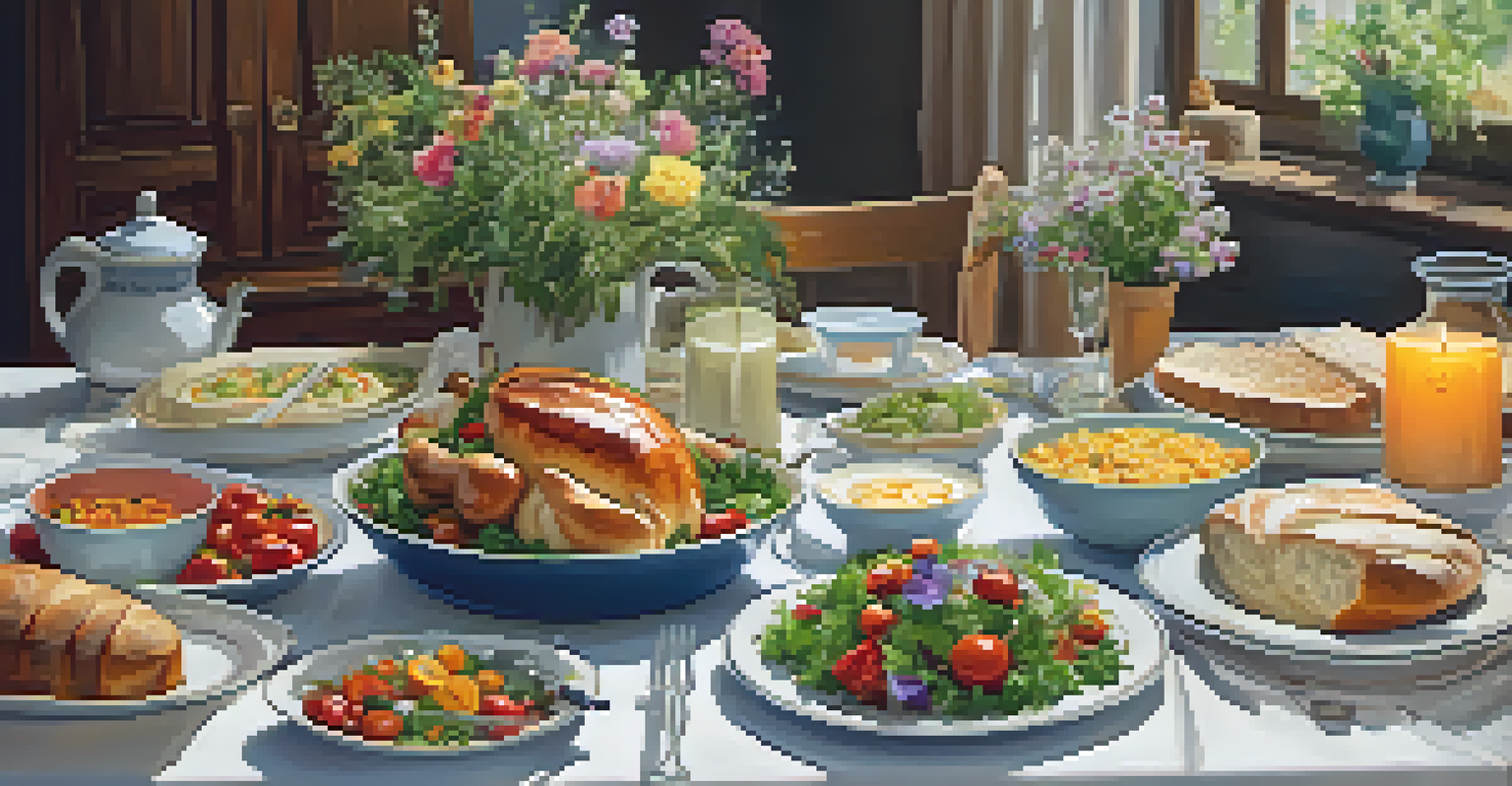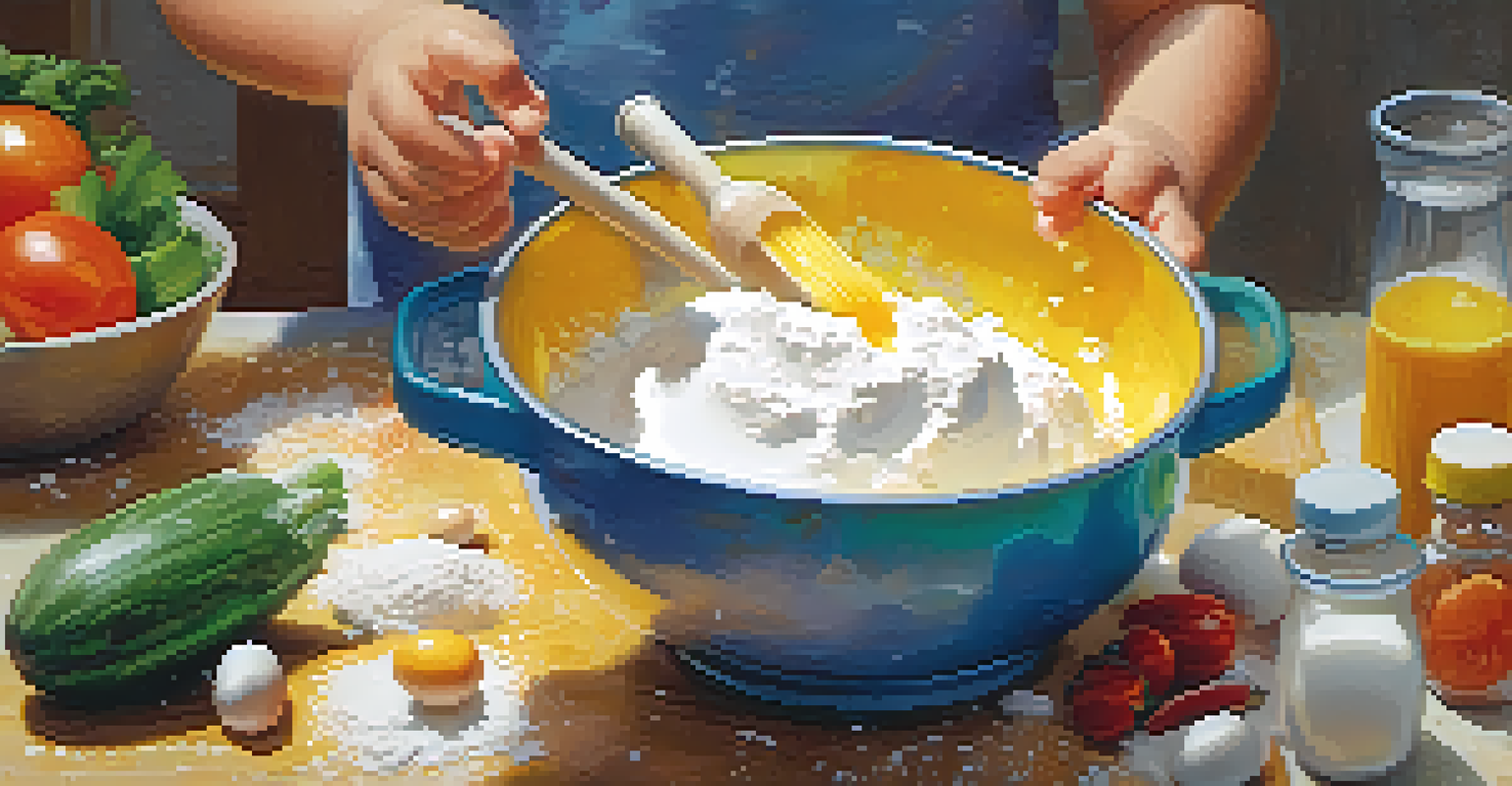Teaching Kids the Value of Home-Cooked Meals

Understanding the Importance of Home-Cooked Meals
Home-cooked meals are more than just food; they're a chance to connect with family. When kids help prepare meals, they learn about nutrition and the effort that goes into cooking. This understanding fosters appreciation for food and encourages healthier eating habits.
Cooking is like love. It should be entered into with abandon or not at all.
In a world filled with fast food and convenience meals, teaching kids about the benefits of home cooking is crucial. It not only promotes better health but also creates lasting memories in the kitchen. These experiences can cultivate a lifelong passion for cooking.
Moreover, home-cooked meals can be a wonderful opportunity for family bonding. Sharing recipes and cooking together can foster communication and teamwork, making meal preparation a fun family activity.
Involving Kids in the Cooking Process
One of the best ways to teach kids about cooking is to get them involved in the kitchen. Start with simple tasks like washing vegetables or measuring ingredients. This hands-on experience can make cooking feel accessible and fun.

As kids grow more comfortable, introduce them to more complex tasks, like chopping or stirring. This gradual increase in responsibility not only builds their skills but also their confidence in the kitchen. They will take pride in the meals they help create.
Home Cooking Fosters Family Bonds
Cooking together creates meaningful family traditions and strengthens connections through shared experiences.
Encouraging creativity is also essential. Allow kids to experiment with flavors and ingredients, which can lead to exciting culinary discoveries. This freedom can make cooking a delightful adventure rather than a chore.
Teaching Nutrition Through Cooking
Cooking at home is an excellent opportunity to teach kids about nutrition. Use meal prep as a chance to explain the benefits of different foods, like why leafy greens are important for health. This knowledge can empower them to make better food choices.
Food brings us together, and when we cook, we create memories that last a lifetime.
Involving kids in meal planning can also spark interest in nutrition. Discussing what makes a balanced meal and allowing them to choose healthy ingredients can be very engaging. This not only educates them but also makes them feel valued in the decision-making process.
Furthermore, understanding portion sizes and the concept of moderation can be taught during cooking. This practical experience can help them develop healthy eating habits that will last a lifetime.
Creating a Family Tradition of Cooking Together
Establishing a family cooking night can create a cherished tradition. Whether it’s pizza night or taco Tuesday, having a designated time for cooking together can strengthen family bonds. It also gives everyone something to look forward to each week.
During these cooking sessions, share stories or memories associated with certain dishes. This storytelling can deepen the connection to the food and make mealtime even more meaningful. Kids will learn that cooking is about more than just eating; it’s about sharing experiences.
Kids Gain Life Skills Through Cooking
Involving children in meal preparation teaches them valuable skills and promotes healthier eating habits.
Involving all family members, from grandparents to siblings, can make these traditions even richer. Each person can contribute their favorite recipes, creating a diverse menu that reflects your family's heritage and preferences.
Encouraging a Positive Attitude Towards Food
Teaching kids to appreciate food starts with modeling a positive attitude. Show enthusiasm for trying new ingredients and dishes, even if they seem unusual at first. Your excitement can be contagious and encourage them to be adventurous eaters.
Discussing the origins of different foods can also enhance their appreciation. For instance, talking about where fruits and vegetables come from can instill curiosity and respect for nature’s bounty. This knowledge can create a deeper connection to what they eat.
Additionally, teaching them to savor their meals by eating mindfully can foster a healthy relationship with food. Encourage them to notice flavors and textures, which can transform eating into an enjoyable experience rather than a rushed activity.
Celebrating Culinary Achievements
Celebrating the meals that kids help prepare can boost their confidence and enthusiasm for cooking. A simple 'family feast' night where everyone enjoys the fruits of their labor can make them feel proud of their contributions. Recognizing their efforts reinforces their love for home-cooked meals.
Take time to showcase their creations through family photos or a cooking journal. Documenting their culinary journey can create a sense of achievement and motivate them to continue exploring in the kitchen. It turns cooking into a fun and rewarding hobby.
Cultural Recipes Broaden Perspectives
Exploring diverse culinary traditions enhances kids' appreciation for different cultures and encourages curiosity.
Additionally, involve friends and extended family in these celebrations. Sharing meals with others can highlight the joy of cooking and create a sense of community around food, further enriching the experience.
Incorporating Cultural Recipes into Cooking Lessons
Incorporating recipes from different cultures can broaden kids' culinary horizons. Each dish tells a story and introduces them to new flavors and cooking techniques. This not only makes cooking more interesting but also fosters an appreciation for diversity.
Exploring cultural dishes can also become a learning opportunity about traditions and histories. Discussing the significance of certain foods in celebrations or holidays can enrich their understanding of various cultures. It can spark conversations about family heritage too.

As they prepare these dishes, encourage kids to ask questions and think critically about the ingredients. This can lead to discussions about sustainability, local farming, and the importance of supporting local food systems.
The Lifelong Benefits of Home Cooking Skills
Teaching kids the value of home-cooked meals equips them with essential life skills. Knowing how to cook can boost their independence, allowing them to make healthier choices as they grow. This foundation can lead them to become confident, capable adults.
Moreover, cooking at home can be a cost-effective alternative to eating out. Kids who understand how to prepare meals are likely to appreciate the value of money and the benefits of budgeting for groceries. This practical skill can serve them well throughout their lives.
Home Cooking Fosters Family Bonds
Preparing meals together creates lasting memories and strengthens family connections.
Finally, fostering a love for home cooking can lead to a lifetime appreciation for food and nutrition. As they mature, children who learned these skills are more likely to prioritize healthy eating, creating a positive impact on their overall well-being.